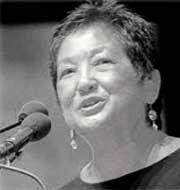LITR 5731: Seminar in American
Multicultural Literature (Immigrant)

Student Poetry Presentation summer 2006
Monday, June 05, 2006
Poetry: Nellie Wong, "When I was Growing Up"
Poetry reader / discussion leader: Kaylee Daniel
Nellie Wong (1934 – present), "When I was Growing Up”

Biographical background:
- Born in Oakland, CA
- Poet and revolutionary feminist activist living in San Francisco
- She was the first U.S.-born daughter of Chinese immigrants
- In the late 1970s and early 1980s, Wong co-founded and performed with an Asian American feminist literary and performance group, Unbound Feet
- She has taught both Women’s Studies and Poetry
- Her work has appeared in approximately 200 anthologies and publications
- She has
donated her papers to the California
Ethnic and Multicultural Archives at UCSB
Wong credits her feminist classmates at SF State with keeping her writing. A male professor had once told her to throw away an angry poem she had written. One classmate told her, "You don't have to listen to him!"
Wong writes directly from her working life as well as from her family history, bridging China and Asian America. Her poetry spans issues of feminism, the fight against racism, workplace injustice, and finding identity as a writer and activist.
(Read Poem)
“When I was Growing Up” talks about Wong’s feelings about growing up with dark skin and the discrimination she suffered because of it. She was not only darker than the white women around her; she was also darker than her sisters who were lighter skinned Asian girls. Wong felt dirty and ugly and felt that her life would be better if her skin were lighter. Towards the end of the poem the reader gains a sense of Wong’s growing acceptance of her skin color as she becomes more comfortable with who she is and how she looks.
Objectives:
Objective 2:
To chart the dynamics, variations, and stages of the immigrant narrative.
Especially concerning the “model
Minority” in that Wong is engaged in assimilating by going to American
schools, reading American magazines, and dating white men, however, she suffers
deep ambivalence concerning her betrayal and shame of her own culture. Because of this she fits the model of the second-generation
as “divided” between traditional identities of homeland or ethnic group and
modern identity of assimilated American. Wong
also fits the model of the second-generation immigrant writing to explore their
conflicted identities.
Objective
3—“The Color Code:” the majority cultures
values concerning light and dark as good/evil, clean/dirty, worthy/and useless.
“There
is a traditional phase in Chinese, "A white covers three uglies",
which says that whiteness can cover any imperfection on face. Chinese women are
always believing in this.” (http://www.public.iastate.edu/~womenstu/ws201student/
beauty/ws201/whitening.html).
Questions for
discussion:
Wong does
interesting things with stanzas in this poem, alternately indenting them.
What meaning was she conveying by doing this?
What does Wong
mean when she writes, “I could not shed my skin in the gray water?”
Wong writes,
“When I was growing up, people would ask if I were Filipino, Polynesian,
Portuguese. They named all colors except white, the shell of my soul but
not my rough dark skin.” What do
you think she was focused on here, the idea that she could not pass for white,
or the idea that her actual heritage or ethnicity was so invaluable that the
majority culture could not differentiate it from other immigrant cultures?
|
|
|
|


